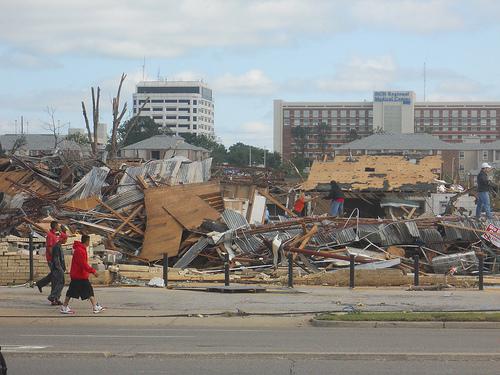 “Most of it happened all at once,” recalls Brad Fisher, Communication Director for DCH Health System, of the tornado that came within mere yards of hitting the main building of Tuscaloosa’s largest hospital.
“Most of it happened all at once,” recalls Brad Fisher, Communication Director for DCH Health System, of the tornado that came within mere yards of hitting the main building of Tuscaloosa’s largest hospital.
“There’s a whole playbook that we go through in order to prepare for disasters like this,” he said.
Although the hospital is prepared to respond to the aftermath of a tornado or other disaster hitting the area, it rarely has to prepare to take a direct hit from it.
“You have to put in place a plan to handle operations if certain parts of your property are compromised, which ours were,” he said.
Just a short time before the deadly, category EF-5 tornado plowed through Tuscaloosa, leaving behind little more than debris, Fischer and other hospital administrators sat in the hospital’s central command center, watching the weather and constructing a plan in case the tornado should become a threat to the hospital.
“We were watching [ABC 33/40 meteorologist] James Spann, just like everyone else was,” he said. “We were expecting the tornado to bypass Tuscaloosa, just like everyone else did.”
Fisher recalls the exact moment when he realized that the tornado was going to pose a direct threat to the hospital.
“All of the sudden, it became clear that not only was there going to be a tornado that would create mass casualties, but also that it was coming directly for us,” he said.
At that point, the hospital began preparing for a major catastrophe.
“Patients were taken out of their rooms into the hallways, covered with blankets, and told to look away from any windows,” Fisher said. “We ran around the building, getting visitors and patients away from the windows.”
Fisher remembers little about the moment that the tornado came within a mere stone’s throw from the main hospital building.
“I didn’t hear or see it,” he said. “Everyone says that it sounds like a train as it passes, but I don’t remember that.”
The next thing he remembers is running through the hospital, checking to see what damage had been done and if anyone was injured.
“I ran out to see if those in the cafeteria were ok,” he said. “I heard crying, whimpering, and cursing. I heard people crying who were hiding under tables and scared to death.”
After the tornado passed, administrators begin to assess the damages.
“Up on the sixth and seventh floors, we lost glass in six or seven rooms that imploded outward, not inward,” Fisher said. “The two electrical substations and main line running to the hospital were damaged. Another problem is that we didn’t have water. Our water supply was hit.”
Miraculously, not a single patient, visitor, or hospital staff member was injured.
Even though the tornado had passed and no one had been injured, the minutes following the tornado’s damage were the virtual calm before the storm.
“The first visitors were the walking wounded,” he said. “They brought themselves in. In a situation like this, ambulances take a while to get to the victims and get back to the hospital.”
In hours following, the hospital dealt with the most visitors ever on a single night.
“We had scores of people show up just because there was a rumor that there was another storm coming,” Fisher said. “So we had all these people show up at the same time. Some were injured, some weren’t, some came just because it was the only place that was standing.”
That night, the emergency room treated approximately 800 storm victims, he said. Around 100 of them were admitted, 13 of which were placed in the intensive care unit. Of the six deaths, three were adults and three were infants.
“At the DCH emergency room, 200 visitors a day is a busy day,” he said. “In one night, we saw and treated over 800.”
Search and rescue teams have recovered few survivors since the night of the storm, he said.
“To my knowledge, just one person has been brought in,” he said. “It was a fellow who got trapped in a camper. He was brought in, treated, and released.”
Without the help of Tuscaloosa community members from all walks of life, Fisher believes the hospital wouldn’t have been able to handle the large number of people needing assistance that night.
“I think Tuscaloosa’s medical community did an excellent job,” he said. “The fact that the medical community put all hands on deck is just outstanding. I’m really proud of the hospital, but the hospital alone, even with all its resources, could not have done it alone.”







